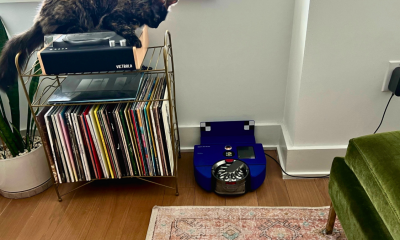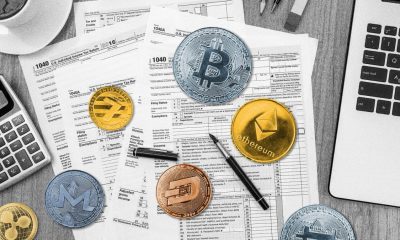Technology
It’s a mistake to think that our online and IRL lives are separate

Before deepfakes and alternative facts, the online world was already telling us fibs. In our series Lies the Internet Told Me, we call ’em all out.
The rules are different there, we repeatedly insist as we draw a line in the sand between what happens online and IRL.
“In Real Life” is meant to suggest our digital lives are separate from our physical ones — that how we comport ourselves while wading through the internet muck has no impact on our tangible, meaty selves.
As all too many of us have realized, often with disastrous consequences, this couldn’t be further from the truth.
Everybody knows you’re a dog
The premise that the internet allows us to be something, practically anything, other than what we actually are is perhaps best exemplified by the classic New Yorker comic depicting a dog perched at a computer.
“On the Internet, nobody knows you’re a dog,” the excited pooch says to its furry companion.
The idea is straightforward, and, frankly, appealing: There is no tie between our online selves and our so-called “real” selves. On the internet, you are whatever it is you say you are.
That cartoon, first published in 1993, is still relevant at times, but there are cracks in the message.
Our shared understanding of the web first formed when being online meant something very different than it does today. The internet was a place to email friends and family. Online life involved joining interest-based forums and looking up information (yes, porn, too). Google and Facebook weren’t behemoths and social media hadn’t led to election meddling, influencer culture, or mob violence, yet.
Being online was kind of like spending time in a make-believe world far from reality. While that fantasy still exists in plenty of places online, our physical lives are ever more connected to our online ones. An increasing amount of stuff you do online is indelibly tied to your real-life self. Especially your social media profiles.
Both public opinion and the law are in agreement: What you post on social media — even if it’s anonymous and non-threatening — has repercussions. These days, you are what you tweet.
Just ask Kloey, a 16-year-old who posted a racial slur on Snapchat, setting off a violent brawl at her Minnesota high school, or Lindsey Stone, the woman whose mocking pose in a Facebook photo in front of the Tomb of the Unknowns in Washington, D.C., sparked a vicious online backlash that led to her being put on unpaid leave. Or how about Justine Sacco? Sacco’s — admittedly bad — tweet attempting to sarcastically mock white privilege got her fired. And we should never forget that, more broadly, a Facebook Like can cost you your job.
Also, deleting something isn’t a guarantee that it will disappear. What you tweeted years ago can come back to haunt you even after you try to scrub it away — take Kevin Hart’s deleted homophobic tweets that led him to lose his Oscar hosting gig as an example.
Presenting the true “us”
For many, Instagram, Facebook, and Twitter accounts are not only the default way of observing the world, but also the primary way in which to present yourself to it. We both judge and are judged by others for our respective online selves, amalgamations that have come to represent the true “us” to the outside world.
Sure, there are lots of fake social media accounts — be they elaborate catfishing tools or pushers of coordinated misinformation campaigns — but this doesn’t describe the average social media user. We may curate and filter what we present on Facebook, but our real names, phone numbers, addresses, and browsing habits, are still attached to that online profile.
Part of this social media and real-life entangling can be attributed to Facebook’s real name policy, a monumental failure of imagination and understanding which insists that “pretending to be anything or anyone isn’t allowed.” Even though the freedom to pretend and the option to be anonymous is not only important for personal development but also serves an important purpose within a functioning democracy. Yes, anonymity also has its drawbacks in a social media world prone to harassment and hate speech. But as recent events like the Cambridge Analytica scandal and U.S. election meddling have demonstrated, it’s not like supposed anonymity-free platforms like Facebook have saved us from harm.
Our social media profiles are just part of the online-IRL dance. The facts and data that constitute us in the eyes of the world — our names, phone numbers, addresses, job histories, spending habits, medical records, travel histories, family relations — are scattered across hundreds if not thousands of hidden databases (and our various social media tools). The internet is so wound up in our daily lives, that it’s become almost impossible to imagine paying a bill or arranging a hangout without it. And when your information gets hacked, that hurts you IRL when your identity is stolen.
Turning lies into truth
The internet promised us we could all be dogs, even if only for an afternoon, only to aggressively go back on its word.
But it doesn’t have to be that way. Being on social media isn’t a requirement, and you can take steps to engage with the digital world privately. It takes work, and won’t be perfect, but then again, what do you expect? Molding the biggest lie of the internet into something tolerable was never going to be easy. Still it’s worth trying.
And, if we ever see each other IRL, maybe we can compare notes on the effort.

-

 Business4 days ago
Business4 days agoAPI startup Noname Security nears $500M deal to sell itself to Akamai
-

 Business6 days ago
Business6 days agoYoshi Mobility has come a long way since gassing up cars on the side of the road
-

 Entertainment4 days ago
Entertainment4 days agoHow to watch ‘Argylle’: When and where is it streaming?
-

 Entertainment3 days ago
Entertainment3 days agoNASA discovered bacteria that wouldn’t die. Now it’s boosting sunscreen.
-

 Business4 days ago
Business4 days agoUS think tank Heritage Foundation hit by cyberattack
-

 Entertainment3 days ago
Entertainment3 days agoDyson 360 Vis Nav robot vacuum review: Dyson should just stick to upright vacuums
-

 Business3 days ago
Business3 days agoTesla drops prices, Meta confirms Llama 3 release, and Apple allows emulators in the App Store
-

 Entertainment4 days ago
Entertainment4 days agoCrypto and taxes: Which forms you need to file



















